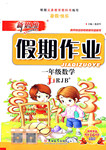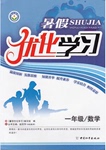题目内容
Henry is a shop assistant (店员). He works in a shop at the station (车站). He gets up at 7:30. He drives to the station. At the station he sees a friend, Mary. She goes to work by train. Her train leaves at 8:00. Then Henry starts to work. At 11:00 he stops work. He has a rest for fifteen minutes and drinks coffee. He doesn't have lunch. At four o'clock he stops work and has tea and a cake. He leaves work at 5:00. He doesn't stay late.
(1) How does Henry go to work?
[ ]
(2) How many hours does Henry work in a day?
[ ]
(3) Does Henry have lunch at home?
[ ]
(4) When does Henry go back to work at noon?
[ ]
(5) When does Mary start work?
[ ]
解析:
|
(1) 由“He drives to the station.”可知,Henry是开车去车站的。 (2) Henry 7:30起床,8:00开始工作,下午5:00下班。其间中午11:00休息15分钟,下午4点吃些茶点。由此可知,Henry一天工作8个多小时。 (3) 根据“He doesn't have lunch.”可知Henry并不吃午饭。 (4) 根据“At 11:00 he stops work. He has a rest for fifteen minutes and drinks coffee.”可知。句意为:11:00他停止工作,休息15分钟并喝杯咖啡。 (5) 由“She goes to work by train. Her train leaves at 8:00.” (She指Mary) 可知,她坐8点的火车去上班,那么Mary上班的时间应是8点以后。 |

 新思维假期作业暑假吉林大学出版社系列答案
新思维假期作业暑假吉林大学出版社系列答案 蓝天教育暑假优化学习系列答案
蓝天教育暑假优化学习系列答案